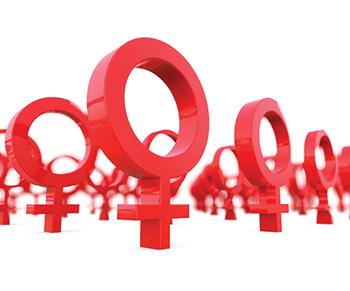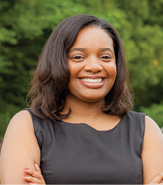May 2018 • Volume 106 • Number 5 • Page 22
Thank you for viewing this Illinois Bar Journal article. Please join the ISBA to access all of our IBJ articles and archives.
Women in the Law
Women Flying Solo
Seasoned female lawyers talk about the special challenges women face when they hang out their solo shingles.

All attorneys who choose to become solo practitioners face the challenges of setting up and running a business. That includes putting together a business plan, separating trust accounts and other funding sources, and attracting and retaining clients.
Women who take the solo journey also face bias and stereotypes that can negatively affect their confidence and their bottom line - although occasionally, being female can be an advantage. That's according to a panel of women lawyers who have started their own firms and who participated earlier this year in an ISBA webinar titled, "On My Own: Starting Your Solo Practice as a Female Attorney."
The challenges all solos face

Criminal defense attorney Sarah Toney of The Toney Law Firm in Chicago notes that some challenges female solos face are not necessarily related to being a woman. When an attorney starts a firm, she says, she or he should create a checklist of everything a solo practitioner needs to do, ranging from registering your entity with the Illinois Supreme Court to getting malpractice insurance.
"There's a lot of minutiae you don't think about," Toney says. "You can't just quit your job, hang a shingle, and start practicing. You need to get an EIN number."
You also need to economize by focusing on the essentials, she says. "You think, 'I need to buy a copy machine' and then you realize, 'What I actually need is a scanner and printer.' You find out, with technology, 'I don't need a landline - I could use that internet-based phone. I don't need a credit-card machine, I can process that over the internet.'"
She adds, "If you're organized, you can be in a very good spot by the time you're ready to start." Part of Toney's organizational scheme: ensuring that she keeps client trust funds separate by ordering checks for her operating account that are a different size and color than her IOLTA checks. That way, "there's never a risk that you mix them up and write a check from a trust account that causes an issue," she says.

It's helpful for solo attorneys to automate as many processes as they can given their limited support staff options, says Cynthia Pietrucha of the Pietrucha Law Firm in Downers Grove. Solos should also think about services like call-answering or temporary staffing when they need extra help and get creative about office space, she says.
Litigators might not even need an office "because they're in court all the time," she says. Transactional attorneys could do pro bono work for a nonprofit in exchange for the occasional use of their conference room. For some attorneys, "you can work from home with the technology we have today," she says.
Pietrucha mentions one office-related issue that's more challenging for women solos than for men: personal security. "If you're in an office by yourself, meeting a stranger off the internet, you have to be careful about what time you're meeting people, and where you're meeting them," she says.
Toney suggests that women thinking about going solo connect with other women who have done the same. "There's a really good network of women out there who want to support other women," she says. "There's no shortage of mentors, or even peers, who will help support you in terms of giving advice, being a sounding board, and not making every person who goes solo reinvent the wheel."
Before she went solo, Toney did plenty of legwork and research on her own, yet she still called upon other women who had gone solo to find out whom they had chosen as a domain host, or a phone company, or a credit-card processing company. "Rather than relying on Google searches, [remember that] women are always happy to help other women," she says.
Facing bias in the boardroom - and courtroom
In addition to the challenges all solos confront, women need to fight their way through biases of various kinds, which often overlap with what female lawyers at larger firms face but are distinct in some respects.
For example, women attorneys sometimes struggle to build confidence, in part because of societal and familial pressures that discourage them from pursuing high-powered careers, especially once they become mothers, Pietrucha says.
And Pietrucha noted a cruel irony: "Other women are sometimes the worst enemies of women," she says. She has encountered women "who didn't respect me as much as they might have respected a man."
She and others have faced "the mental struggles of having confidence to be an attorney as a woman, when you have other women - and men - telling you, 'You can't be an attorney,'" she says. "Men are perceived to be attorneys - middle-aged and older while males. If people see somebody who's younger, female, or of a different race, that's not the image people think about. That's changing with the internet" and with how the preferences of potential clients are changing, she says.
Women who appear in court, especially when they're younger, are sometimes assumed to be a junior partner or not a lawyer, Toney agrees. She remembers being a 25-year-old recently minted J.D. at the Cook County criminal courtroom at 26th and California watching the judge call cases by picking out the lawyers he knew.
"Even though I was standing there, I got completely overlooked," she says. "He couldn't believe I had a felony case at 26th and Cal. That doesn't happen as much as you get more experienced. But you also have to have the confidence to assert yourself.… There is always that [possibility], especially when you're younger, that the judge will think you're there as somebody's law clerk."

Roya Samarghandi, managing attorney at Carmel Law in Chicago, remembers facing many of those challenges when she launched her criminal defense and family law practice through the Justice Entrepreneurs Project incubator of the Chicago Bar Foundation. The incubator provides pro bono mentoring and placements to help young lawyers get started or change directions.
"The implicit bias I faced was the same, being mistaken as not an attorney," she says. "You have to work that much harder to make an impact."
Toney recalls similar anecdotes from the book Angel of Death Row, written by Andrea Lyon, former dean of Valparaiso University Law School and a former Cook County public defender who handled 17 capital cases and did not have a single client sentenced to death. "When she was on the homicide task force, she would walk into the back [of the chambers] and judges always assumed she was a family member and stopped her. They never recognized that she was a lawyer. People like her paved the way for me."
Double standard
Once the judge and jury have accepted that you're an attorney, Toney says, a woman needs to be conscious of the dynamics as the case moves forward. "You have to be aware of the optics [and make sure] you're always doing your best, you're prepared, and you're kind," she says. And however unjustified, there can be double standards that cut against you: "A male lawyer advocating forcefully is a good advocate, where a woman can be looked at as bitchy or moody."
Female attorneys need to be aware of others with whom they interact regularly - opposing counsel and judges in particular - who tend to be rude and even bullying toward them, Pietrucha says. "I use software to remind myself how to act around certain attorneys," she says. "I deal with administrative law judges, investigators, opposing counsel. Sometimes there's a certain attitude - calling me 'sweetheart' - that's rude or condescending."
With those people, Pietrucha steels herself and puts on a certain persona, she says. "I'm kind of acting. I can't necessarily have the same personality I always have," she says. "I might have to be more aggressive, to meet them at a certain level. Or I might have to overlook them being a bully so I can focus on the real facts of the case."
Samarghandi recalled Chicago attorney Lori Levin sharing an anecdote about a bombastic criminal defense attorney whom she faced when she was a prosecutor and learned to outfox. "She played up being meek - I don't want to say helpless, but a little helpless," Samarghandi recalls. As a result, "he expected her to back down and be intimidated. She was not."
The female advantage
Being female can be helpful in certain instances, Toney believes. Some defendants might specifically want a woman because they believe she will prompt jury members to be more sympathetic to their cause, especially in cases like child custody battles or sexual assault.
"A husband might think having a female lawyer, the optics would play better," she says. "I hired a female lawyer - of course, I wouldn't be unfair to my wife." Or, in a criminal-defense case, "a female lawyer sits next to me, pats my shoulder, whispers to me - she's not afraid of me, therefore I can't be this dangerous criminal."
Overall, given that misconceptions can sometimes work to her advantage, Samarghandi wouldn't necessarily say that being a woman has made her success that much harder to achieve. She agrees that some criminal clients and some men in divorce cases prefer a female attorney.
In the latter scenario, a woman "can, at times give them advice that a male attorney can't because I can play devil's advocate," Samarghandi says. "And explicit bias, I have turned to my advantage, if it's underestimating me, or whatever the case may be, there's opportunities to take advantage of misconceptions someone may have."
Bias and fee collection
Women solos sometimes encounter bias from clients, who might, for example, think they can have more control and avoid payments, assuming a woman will be more lenient, Toney says. "That's the sort of thing you have to know in opening your own firm," she says. "You have to be prepared to set the tone: that you care about their case, but the money aspect is separate" from your empathy about the charges they face.
To help ensure that payments don't slide, women solos should have a strongly worded retainer agreement with everything laid out at the outset. "That way, there's no opportunity for them to take advantage of you because they think you're going to be more sympathetic to them," Toney says. "Also, you can't be afraid to quote what you are actually worth. There's a [perception] that women feel like they're not worth as much as a man."
Toney recalls one prospective client who called and said he was being railroaded. "He expected a discount - he kept saying it over and over," she says. "It's important to set the tone: this is how payment is going to be expected, and there aren't going to be discussions about your personal circumstances and excuses. This is a business, and we want to focus on your legal issues."
Pietrucha typically works on contingency, but she has faced situations in which clients think they don't have to pay her. "Strategically, we sometimes use men to do things," she says. "We know if they do them - like collecting money from clients - a client might tell us 10 times they can't pay, but maybe a man might influence them to pay because of different [communication] styles."
The solo advantage
Of course, one problem women solos do not face is bias on the part of lawyer coworkers, Toney says. "You don't have to watch men being [unfairly] promoted or experience inequality in pay," she says. "That's a big benefit. You get all the credit for the work you've done."
Toney recounts women from big firms telling her about cases in which they have done the majority of work only to have the client take a male senior partner out for drinks at the end to celebrate. "You reap the reward" as a solo practitioner, she says. "You get treated like the lawyer you are."
For solo women who are mothers, Toney says, you don't need to ask a boss' permission to find the right work-life balance. "There's definitely the flexibility there," she says. "People who don't have court schedules are not required to put in face time like at a firm. If you want to work at night when your children are sleeping and give them quality time during the day," you can do so, she says. "That's a big advantage."
Samarghandi also sees many advantages to solo practice - for the right type of person. "I don't think starting your own practice is for everyone," she says. "You have to be self-motivated and disciplined and a little bit of a hustler.… At the end of the day, there's nobody to rely on other than yourself. It's an eat-what-you-kill scenario."
People contemplating solo practice need to assess the market and themselves, Samarghandi says. "There are huge benefits to starting your own practice, but it's a very saturated market. People need to do due diligence, do their research, and be very mindful of what success looks like to them and what it's going to take to get there."

Ed Finkel is an Evanston-based freelance writer.
edfinkel@earthlink.net
Going solo? Visit PracticeHQ
Ready to hang out a shingle? The ISBA's members-only PracticeHQ has a wealth of information about starting, building, and managing a practice, much of it tailored to sole practitioners. You'll find checklists, whitepapers, videos, and more at https://www.isba.org/practicehq.


Member Comments (1)
Great Article and interesting perspectives and incite. As a female solo myself, it was affirming to read some of the difficulties that I have faced, have been faced by many others as well.